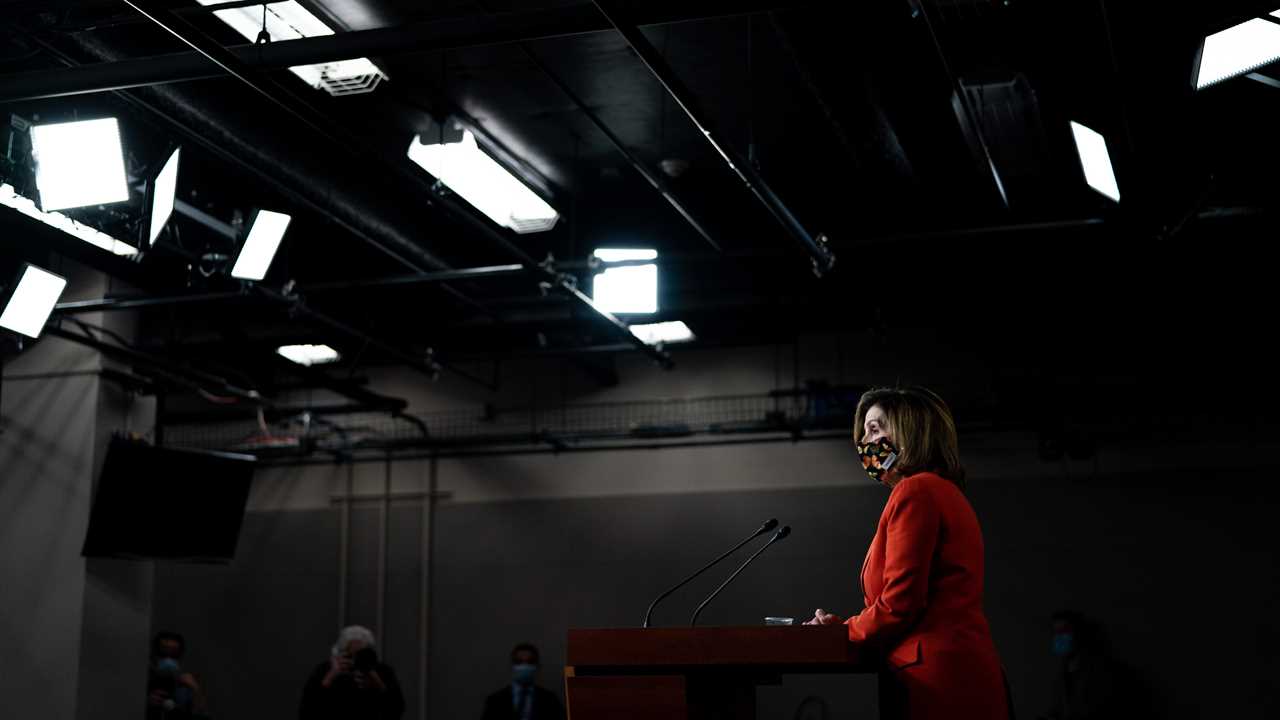
WASHINGTON — Speaker Nancy Pelosi said on Friday that House impeachment managers were preparing to prosecute President Trump in the Senate, but she refused to offer a timeline for when they would move forward with a never-before-attempted trial of a former president.
At a news conference two days after the House impeached Mr. Trump in a bipartisan vote, Ms. Pelosi made clear that her first priority was ensuring the security of the Capitol and lawmakers before President-elect Joseph R. Biden Jr.’s inauguration on Wednesday.
But growing emotional at times as she recounted seeing the image of a rioter barging through the Capitol in a “Camp Auschwitz” sweatshirt, Ms. Pelosi vowed accountability would soon follow for Mr. Trump, whom the House charged with “incitement of insurrection” for his role in egging on a violent mob that stormed the building. She also pledged to pursue the perpetrators of the rampage as well as far-right lawmakers if they were found to have aided in the assault.
“One week ago, on Jan. 6, there was an act of insurrection perpetrated on the Capitol of the United States, incentivized by the president of the United States,” she said. “One week later, Wednesday to Wednesday, that president was impeached in a bipartisan way by the House of Representatives — so urgent was the matter. They are now working on taking this to trial.”
The speaker’s decision to delay sending the article was reminiscent of a similar maneuver a year ago, when she waited almost a month to press charges against Mr. Trump after the House voted to impeach him the first time for pressuring Ukraine to smear Mr. Biden. This time, though, Democrats in both chambers involved in the impeachment case said they expected the delay to be brief. Ms. Pelosi could transmit the article as soon as Monday, they said, prompting the start of a trial just as power is being transferred to Mr. Biden.
The House was waiting, at least in part, to determine the outcome of negotiations between Senate Democrats and Republicans over the shape of a highly unusual proceeding. On the cusp of taking unified control of Washington, Democrats were working to draft rules that would allow the Senate to operate on dual tracks to confirm Mr. Biden’s cabinet and begin moving his legislative agenda while trying Mr. Trump.
Unlike a year ago when he sought to use the trial rules to undercut the prosecution, Senator Mitch McConnell, the Republican leader, who is said to approve of the impeachment drive, appeared more willing to work in concert with Democrats.
Senator Kevin Cramer, Republican of North Dakota, told Business Insider that Mr. McConnell had told him the decision to acquit or convict was a “vote of conscience” — a stark departure from the last trial, when Mr. McConnell actively worked to acquit the president.
Mr. Cramer said he did not want to convict Mr. Trump, but would consider voting in favor of disqualifying him from holding future office. The Senate could apply that punishment by a simple majority vote, but only if two-thirds of senators first found Mr. Trump guilty. That would take 17 Republicans joining all 50 of the Senate’s Democrats to vote to convict.
Republicans were already measuring the difficult political and constitutional dilemma the trial would present. Mr. Trump remains the most popular figure in their party, and elected Republicans will have to balance their own anger at his actions with the potential backlash to finding him guilty of high crimes and misdemeanors and blocking him from another term.
“A conviction of Trump may mean he doesn’t run again, but it doesn’t mean he gives up without a fight,” Mr. Cramer told Business Insider.
It was hard to overstate the fury of some Republican senators, whose lives — along with that of the vice president — were endangered during the siege. Senator Ben Sasse, a Nebraska Republican who has expressed openness to the impeachment case, warned in a statement on Friday that “rage-peddlers are going to try to whitewash the attack on the Capitol.”
“Every American needs to understand what the Department of Justice has just made public: Investigators have strong evidence to suggest that some of the rioters who stormed the United States Capitol planned to kidnap and possibly assassinate the vice president,” Mr. Sasse said.
“These men weren’t drunks who got rowdy,” he added, “they were terrorists attacking this country’s constitutionally mandated transfer of power.”






